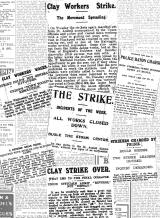CLAY WORKERS' STRIKE
During the years 1911 to 1913 there was much industrial unrest and many strikes throughout the UK by coal miners, railway workers and dockers in particular and even by agricultural labourers. In Cornwall trade unions had not made much impact until the Workers Union recruited many members among the workers in the China Clay industry. During 1912 they began a campaign for improved conditions and higher pay and in June 1913 wrote an ultimatum to the employing companies with their demands - in particular a minimum weekly wage of 25 shillings. While they waited for a reply the union organisers held meetings to gather support. Suddenly about half the workers at one small works went out on strike on 21st July 1913. Initially there was little support for them, but by the end of July it was being reported that most clay workers in mid-Cornwall were out on strike.
There was not unanimous support for the strike - but threats, intimidation and even beatings ensured that nearly every man did join in, and by about the third week of August all the clay works in mid-Cornwall were closed down. The situation became very tense, police reinforcements were brought in from Wales, Bristol and Devon doubling the 200 police that had already been brought in from all over Cornwall. There were a few serious violent incidents – the worst incident was a baton charge by the police at a crowd. Support for the strike appears to have waned during September and some works were re-opened. In October the employers opened all the works and said that those men who did not re-apply for their jobs within 3 days would not be employed. At a meeting of strikers the next day they accepted the advice of the Strike Committee and returned to work. Although it appeared they had been defeated after their ordeal, some employers soon afterwards increased their wages.
Extract from a contemporary poem by a clay worker
... At FOXHOLE we setteled next morning to meet
The old scheme of wages we had to defeat;
For wages at present only just keep us alive
and now we are determined to reach "TWENTY FIVE".
... The Glamorgan police were all watching their tricks,
And demanded the pickets to give up their sticks,
When they caught a small number down in a by-lane,
They acted like demons or men gone insane.
... Well, after ten weeks of hard fighting, we decided to retreat,
But some may claim it to be a defeat,
We are not downhearted, Boys, no not yet,
For an advance in wages we hope soon to get.
So boys join the workers union
And win the victory next time,
And if you'll promise to do so, why then I'll end my rhyme,
To see you all in the union is just what we would like,
Then we could settle by arbilration and thus avoid a strike.
